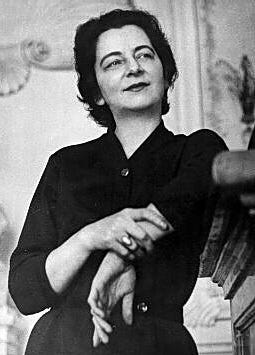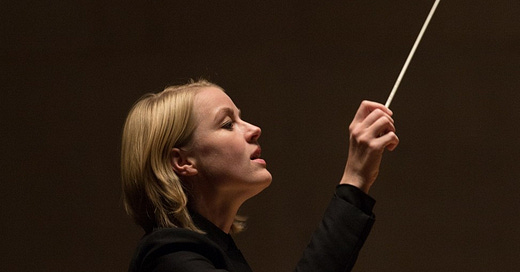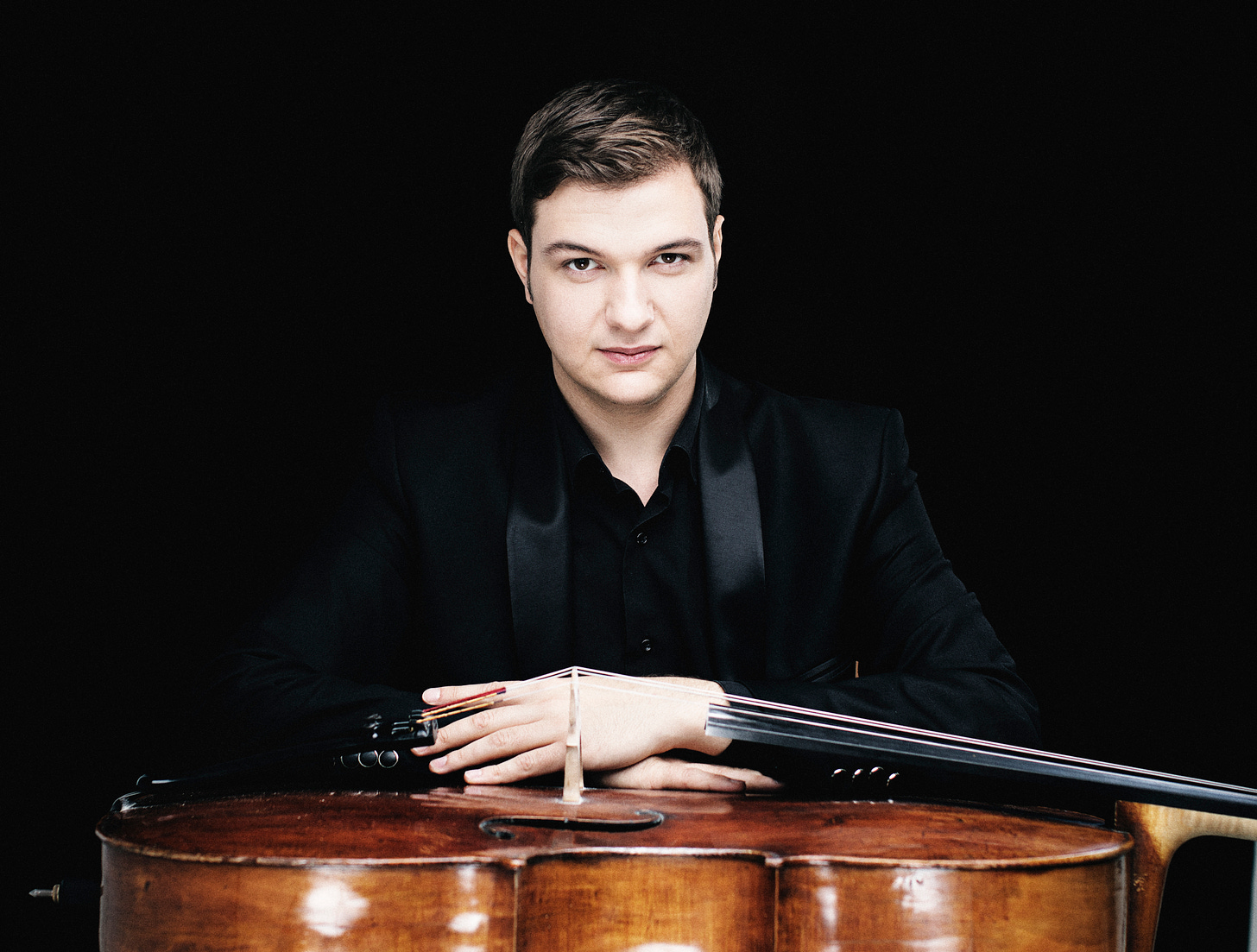Symphony Review: Ruth Reinhardt Shines in 20th-Century Works at her SLSO debut
Works by Grażyna Bacewicz and Hindemith are very persuasive; Dvořák cello concerto, not so much.
The St. Louis Symphony Orchestra (SLSO) concerts this past weekend (April 26 and 27) featured three local previews: two performers and one composer. For me, it was the later who left the most lasting impression.
The composer in question was Grażyna Bacewicz (1909–1969), who was a highly regarded violinist and pianist as well as a composer. A graduate of the Warsaw Conservatory of Music, she also studied composition with Nadia Boulanger in Paris—as did many young composers in the 1920s, both European and American. Back in Poland, she enjoyed considerable success as both a performer and composer, but after a serious automobile accident in 1954, she began to concentrate primarily on her career as a composer.
Although famous in Poland, both then and now, Bacewicz has only recently started receiving some much-deserved attention elsewhere. Among those embracing her music is conductor Ruth Reinhardt, who made her SLSO debut Saturday night leading the string section is a bracing St. Louis premiere of Bacewicz’s 1948 Concerto for String Orchestra.

Rich with counterpoint and generally neoclassical in style, the Concerto also has echoes of Shostakovich and, in the way individual sections are highlighted here and there, of the Baroque concerto grosso as well. That aspect of the piece gave the first-chair players some nice solo bits, all delivered neatly by Associate Concertmaster Erin Schreiber, Principal Second Violin Alison Harney, Principal Viola Beth Guterman Chu, and Principal Cello Daniel Lee. And kudos to the entire string section, which distinguished itself with this work.
Reinhardt conducted with precision and passion. She clearly communicated her love of Bacewicz’s music. The Allegro first movement was energetic and had more of a terpsichorean feel than the Amadeus Chamber Orchestra recording that’s in the SLSO’s Spotify playlist. The second movement Andante was beautifully nocturnal with a tragic subtext and the concluding Vivo had all the vigorous drive one could hope for. I was, in short, left with the conviction that I needed to hear more of Bacewicz’s music.
“Programmatically,” says the conductor’s web site, “Reinhardt’s interests have led her toward an in-depth exploration of contemporary repertoire” and are “strongly centered on European composers.” No surprise, then, that her strong performance of the Bacewicz Concerto was followed by an equally compelling reading of the Mathis der Maler (Matthias the Painter) Symphony by Paul Hindemith (1895–1963).
Hindemith intended it as a kind of preview for the opera Matis der Maler, which he was working on at the time. The libretto was to be based on the life of the artist Matthias Grünewald (c. 1470–1528) who, in Hindemith’s day, was widely regarded as a defender of freedom of expression, as evidenced by his participation in the German Peasants’ War of 1524. The composer had gotten as far as writing some instrumental passages for the opera when legendary conductor Wilhelm Furtwängler asked him to write a new orchestral work for the Berlin Philharmonic. Hindemith combined his two brief interludes with a new (and far more substantial) third movement based on a scene in which Grünewald dreams that he is St. Anthony being tormented by demons, and the Symphony was born.
It takes more than one movement to make a symphony, though. To me that finale is so much more closely tied to the action of the opera, and as a result more emotionally complex than the first two that the Symphony has never felt like a single coherent work. Reinhardt certainly made a convincing case for treating it like one, though. Her skill in maintaining a good balance among the sections of the orchestra was especially welcome both here and in the Dvořák Cello Concerto that followed.
The first movement, “Engelkonzert” (Angelic Concert), would eventually become the opera’s overture. Its bright orchestral colors—especially the use of the brass, glockenspiel, and triangle in the final moments—did, indeed, sound angelic. The brass section was in fine form Saturday night, as were percussionists Will James, Alan Stewart, and Kevin Ritenauer, along with the ever reliable Shannon Wood on typani. The solemn ”Grablegung” (“Entombment”), with its elegiac solos for flute and oboe (wonderfully done by Andrea Kaplan and Phil Ross, respectively), was powerfully moving.
The finale, “Versuchung des heiligen Antonius” (“Temptation of St. Anthony”), can sound episodic, thanks to the often abrupt changes in mood stemming from its strong dependance on the opera’s narrative. Reinhardt maintained a sense of forward momentum, though, and did an impressive job of keeping the various threads of Hindemith’s complex orchestration clear.
The evening concluded with the last (and possibly the greatest) of the large orchestral works of Antonín Dvořák (1841–1904), his Cello Concerto in B minor, Op. 104. Completed during the composer's final year in America (1895), it's suffused with the dark romanticism of (and probably a strong dollop of homesickness for) the Bohemian countryside that the composer loved so dearly. It’s music that leaves nothing to chance and offers great opportunities for a soloist willing to take on its technical and emotional challenges.
The soloist, Romanian cellist Andrei Ioniță, has a wide-ranging repertoire (including nearly all of his instrument’s Greatest Hits) and is apparently quite fond of the Dvořák concerto. Alas, I did not find either his or Reinhard’s view of the piece congenial.
Reinhardt started out strongly with a commanding delivery of the first theme, but both the second theme and the development section of the first movement felt a bit too leisurely. I found Ioniță’s sound lacking in warmth and bit thin, although to be fair, some of that might have been due to the excessively dry, low-resonance acoustics of the Stifel Theatre. Overall, the performance felt a bit under-rehearsed and in need of more emotional and tonal variety.
Still, it’s truly great music, and the Saturday night audience responded warmly. So much so that Ioniță returned for two encores. Which was fortunate, as I found both of those to be more absorbing than the concerto.
Encore number one was Black Run, a wildly virtuosic homage to American Bluegrass by contemporary Swedish composer and multi-instrumentalist Svante Henryson (b. 1963), whose musical interests include jazz and rock as well as classical. You could certainly hear all of this is this high-octane fun ride. Played with stunning skill by Ioniță, the piece pushes the resources of the cello to their limits. This is likely the sort of thing that led The Times of London to call him “one of the most exciting cellists to have emerged for a decade.”
The second encore was less flashy but no less impressive: one of the many dance-based movements from the Cello Suite No. 3 in C major, BWV 1009, by J. S. Bach. That made it a smart follow-up to Black Run, which also had its roots in dance.
Next from the SLSO: Music Director Stéphane Denève returns to conduct St. Louis Symphony Orchestra and Chorus in the regular season finale, Peer Gynt. Soprano Camilla Tilling sings the role of Solveig and Vidar Skrede plays the Hardanger fiddle. Originally commissioned for the Boston Symphony Orchestra, this adaptation of the 1876 epic play by Henrik Ibsen is written and directed by writer/actor/director Bill Barclay and includes most of the incidental music Greig wrote for the play. Performances are Saturday at 7:30 pm and Sunday at 3 pm, May 2 and 3, at the Stifel Theatre.






Where did you sit for the Saturday night performance? At the risk of stating the obvious, the location really does make a difference in the balance. I was at the Sunday afternoon performance, in the center of the balcony towards the top of Stifel. The sound is dry, but a clear dry, where I heard textures in the relatively dry acoustic that I didn't recognize from past performances or recordings. Another concertgoer yesterday said that he couldn't hear the timpani well in the Hindemith, but he was downstairs rather than upstairs. I heard the timpani just fine from upstairs all throughout.
BTW, just one encore at the Sunday matinee performance from the cellist, and evidently not the same encore as Saturday night: the opening movement from JSB's Suite No. 1 for solo cello.
Terrific.